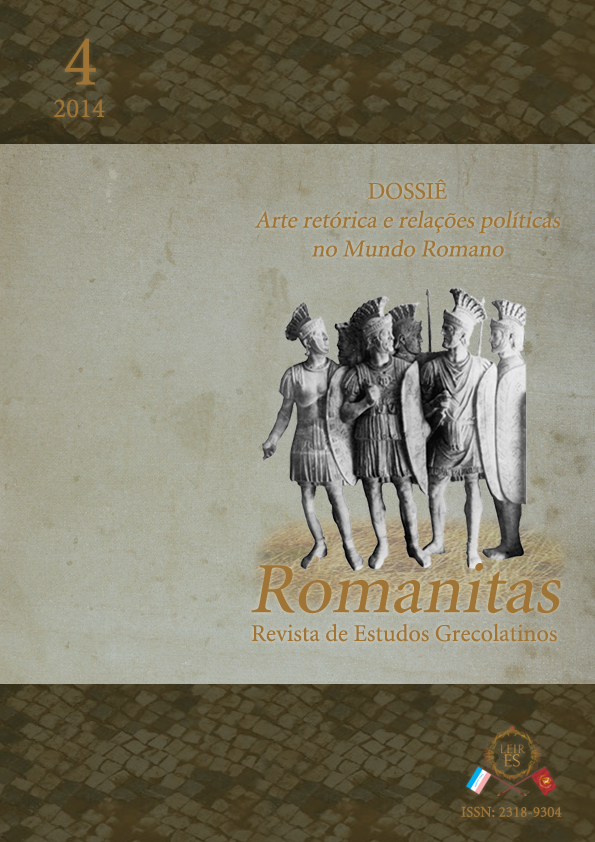Uma análise sobre o transcrito público do imperador Marco Aurélio Carino (282-285 d.C.)
DOI :
https://doi.org/10.17648/rom.v0i4.9205Mots-clés :
Carino, Transcrito público, Poder, LegitimidadeRésumé
Neste artigo, temos por objetivo analisar a representação do poder do imperador romano Marco Aurélio Carino (282-285) a partir do referencial teórico do transcrito público, tal como proposto pelo antropólogo americano James C. Scott, no livro Domination and the arts of resistance: hidden transcripts. A análise do transcrito público de Carino nos permitirá, não obstante, discutir os fatores que caracterizaram o poder imperial romano durante o século III, como a importância conferida às relações familiares e ao apoio das divindades como fatores de legitimação do poder.Téléchargements
Références
Documentação primária impressa
AURELIO VICTOR. De Caesaribus. Translated by H.W. Bird. Liverpool: Liverpool Press, 1994.
FLAVIO EUTROPIO. Breuiarium. Translated by H.W. Bird. Liverpool: Liverpool University Press, 1993.
FESTUS. Breviarium. Translated by Thomas M. Banchich & Jennifer A. Meka. Buffalo, NY: Canisius College, 2001.
GEORGIUS CEDRENUS. Compendium Historiarum. Tr. Immanuele Bekkero. Bonnae: Impensis Ed. Weberi, 1838 (Corpus Scriptorum Historiae Byzantinae).
GEORGIUS SYNCELLUS. Cronografiae. Tr. Guilielmus Dindorfius. Bonnae: Impensis Ed. Weberi, 1829 (Corpus Scriptorum Historiae Byzantinae).
JEROME. Chronicle. Translated by Malcolm D. Donalson. In. SCHAFF, P. & WACE, H. (Ed.). A select library of Nicene and Post-Nicene Fathers of the Christian Church. Edinburgh: T&T Clark, 1896. t. V-1.
MALALAS. Chronographia. Tr. Ludovicus Dindorfius. Bonnae: Impensis Ed. Weberi, 1831 (Corpus Scriptorum Historiae Byzantinae).
PSEUDO-AURELIUS VICTOR. Epitome De Caesaribus. Translated by Thomas M. Banchich. Buffalo, NY: Canisius College, 2001.
SIDONIUS APOLLINARIUS EPISCOPUS. Carmina. In: MIGNE, J. P. Patrologia Latina. Paris, 1865. v. LVI.
ZONARAS. The History of Zonaras. Translated by Thomas M. Banchich & Eugene N. Lane. London: Routledge, 2012.
ZOSIMO. Historia Nueva. Traducción de José M. Candau Morón. Madrid: Gredos: 1992.
Documentação de cultura material
DESSAU, H. Inscriptiones Latinae Selectae. Berlim, 1892-1916.
WEBB, P. Probus to Ammandus. In: MATTINGLY, H.; SYDENHAM, E. A. The Roman imperial coinage. Londres: Spink & Son, 1933. v. V-2.
Obras de apoio
BARNES, T. D. Constantine and Eusebius. Cambridge: Harvard University Press, 1981.
CHARTIER, R. A história cultural: entre práticas e representações. Lisboa: Difel, 1990.
CHRISTOL, M. L’ Empire Romain du IIIe Siècle. Paris: Éditions Errance, 2006.
GONÇALVES, A. T. M. 'Funus Imperatorum': uma análise da cerimônia de apoteose do imperador Septímio Severo. Phoinix. v. 9, p. 25-36, 2003.
GONÇALVES, A. T. M. Uma análise da 'damnatio memoriae' de Geta. In: FUNARI, P. P. A.; SILVA, G. J. MARTINS, A. L. (Org.). História Antiga: contribuições brasileiras. São Paulo: Annablume, 2008, p. 115-128.
LEADBETTER, B. Galerius and the will of Diocletian. London: Routledge, 2009.
POTTER, D. S. The Roman Empire at bay: AD 180-395. London: Routledge, 2004.
PEACHIN, M. Roman imperial titulature and chronology (AD 235-285). Amsterdam: J.C. Gieben, 1990.
MENDES, N. M. O culto imperial como discurso de Romanização. Revista Maracanan, nº 9, p. 144-165, 2013.
PRICE, S. From noble funerals to divine cult: the consecration of Roman Emperors. In. CANNADINE, D. PRICE, S. (Ed.) Rituals of royalty. Cambridge: Cambridge University Press, p. 56-105, 1987.
SCOTT, J. C. Domination and the arts of resistance: hidden transcripts. New Haven: Yale University Press, 1990.
Téléchargements
Publiée
Numéro
Rubrique
Licence
(c) Copyright Romanitas - Revista de Estudos Grecolatinos 2015

Ce travail est disponible sous licence Creative Commons Attribution - Pas d'Utilisation Commerciale - Pas de Modification 4.0 International.
a. L’Auteur mantient les droits d’Auteur et accorde à la revue le droit de première publication.
b. L’Auteur a l’autorisation pour assumer des contrats additionnels séparément, pour distribution non exclusive de la version du travail publiée dans cette revue (ex.: publier en répertoire institutionnel ou comme chapitre de livre), avec reconnaissance de l’Auteur et publication initiale dans cette revue.
c. L’Auteur a l’autorisation et est encouragé à publier et distribuer leur travail en ligne (ex.: dans des répertoires institutionnels ou dans votre page personnelle) après la première publication par la revue, avec les créances.
d. Les textes de la revue sont publiés sous Licence CC BY 4.0 Deed Attribution 4.0 International (CC BY).




























